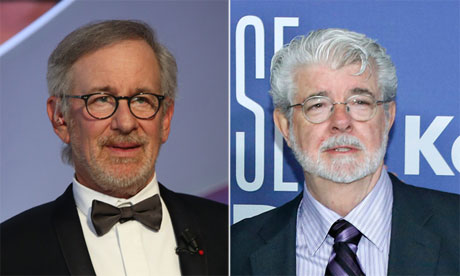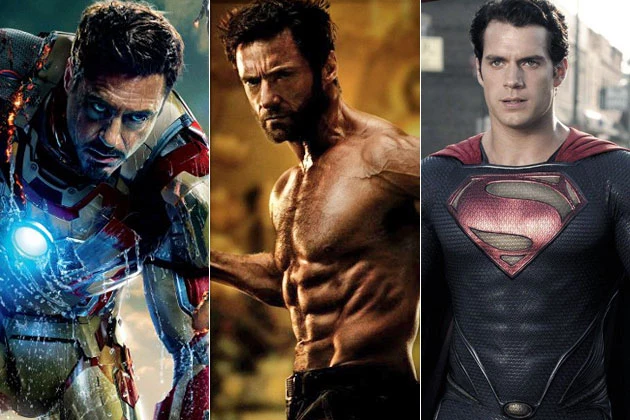Showing posts with label article. Show all posts
Showing posts with label article. Show all posts
Monday, June 17, 2013
How Spielberg's "Hollywood Implosion" theory isn't that crazy after all
Last week, Steven Spielberg and George Lucas made a bold prediction regarding the future of the film industry, saying prices will skyrocket for blockbusters after a few 250Mil+ failures. Online, the reception of these comments has been pretty harsh to say the least, with Duncan Jones summarizing the comments as a "a fascinating insight into 2 out of touch, old men." That pretty much sums up the viewpoint of the internet, but really, people are forgetting how much Lucas and Spielburg know about the industry.
The most common criticism of the statement is simply mentioning the prequel trilogy and Crystal Skull. But really, those two films are irrelevant to the directors' insights and knowledge of the industry. Spielburg continues to make highly acclaimed films, such as Lincoln from just last year. Is the internet's attention span so short that they actually forgot about Spielburg's award-nominated blockbuster. Lucas, on the other hand, has a different perspective- one of failure, after he fought with studios to make Red Tails and even after its completion, Lucas failed to get the marketing he desired, resulting in lackluster box office returns.
In essence, the two are saying that in the near future, studios will lose huge amount of money on blockbusters. As a result, high-budgeted films will then have higher ticket prices, while lower-budgeted films will actually see a reduction of prices. Spielberg says that something like Iron Man 3 will cost $25 to see, while something like Lincoln will cost just $7. Spielburg goes on to say that in the future, blockbusters will be major events, like live sports or concerts, and thus will have premium prices.
Many people claim that this is unrealistic, since today, films are almost instantly available online via a pirated copy, and people will simply stop going if prices raise that much. However, these critics seem to forget several things about Hollywood. First, Hollywood has always been about gimmicks designed to put people in seats, and have been doing so since the dawn of television. Be it 3-D, Imax, or a new experience, studios and theaters will invent ways to get people into theaters and if needed, make going to the cinema a major event.
However, there's surely a limit. At some point, prices will be so high that people will just download a bootleg. But perhaps the biggest step in Spielburg's prediction coming a reality is Hollywood cracking down on piracy once and for all. Copyright laws will soon be altered, and very well could give studios more power to prosecute those that supply the illegal copies of movies, and even those who download them. If prices are raised drastically, studios would be able to force cinemas into hiring additional employees who monitor theaters looking for those with recording equipment. These could be trained studio employees, working at individual theaters with licences to "high-piracy" releases, equipped with special tools, knowledge and legal powers to stop would-be bootleggers and pirates.
If the theater refuses to comply, then they simply stop getting blockbusters, driving down their attendance and revenue. Watermarks can be subtley placed over images, which is already being done with the Prima Cinema, a $35,000 device which allows individuals to watch first-run Hollywood films in their own home. the watermarks are undetectable to the human eye, but can be seen by computer programs easily. If each theater had a personal watermark on each print of a film, a leaked copy could be tracked to the theater, and even a particular screening.
So, with raised security and strengthened legal powers, piracy can be seriously halted. If piracy is stifled, films could play for longer periods of time, and an eventual home video release could take place over a year after a theatrical release. I personally have no doubt that if something like Iron Man 3 was exclusive to cinemas for an entire year or more, people would flock to see it, no matter the price. Sure, less would likely be sold, but since the price of a ticket would be up 250%, and it would be screening for several months at a time, its budget would be quickly recovered.
I am not saying Spielburg and Lucas are correct. Many variables are in play, but it is foolish to write off their predictions as two out of touch old men. At the very least, the world of high-budget cinema will soon change radically.
Friday, June 14, 2013
Great Responsibilities- the eventual death of superhero movies
We have not seen a year without superhero movies since 2001. Since then, we have seen nearly every superhero have a franchise of their own, and several have had multiple franchises. And as of 2013, there is no end in sight. The end (at least for the time being) must be on the horizon. Film is suffering, audiences are suffering, and studios are setting themselves up for suffering- they might just not know it yet.
The films themselves are weakening substantially. After The Avengers pioneered a sort of superhero extravaganza, which was incredibly entertaining, yet felt cheap, almost worthy of a two-hour special on ABC with all of the "special guest stars" and cheap narrative tricks, there is no new ground for superhero movies to develop. There are only so many ways to explore the consequences of a "great responsibility," and every angle has been explored multiple times in just the past five years. Good or evil, action or inaction, showmanship or humility, and countless more have been completed milked dry.
Additionally, the films essentially are in two camps- the Marvel films, generally created for "cheap" action but packed with thrills and laughs (the Iron Man model), and the DC films, meant to serve "adults as well as children," lacking the humor of comic books and attempted to dwell on deeper themes (the Dark Knight model). Man of Steel, released nationwide today, appears to conform to the latter model, but since I have not seen it yet, I can't comment on it. However, both models have serious downfalls.
Marvel films are certainly more child-geared, which in itself isn't a bad thing, especially for the studios. They make boats of money, which more adult films cannot do. As a result, more adult-oriented films fail to receive studio backing, with the exception of those with Scorsese-like names attached. The Marvel films are the lesser problem. The Dark Knight model films deceive audiences, tricking adults into thinking that they are seeing a deep, thought-provoking film, when in reality they are seeing an action movie with "deep" themes tacked on top so clumsily, you can see the teeth marks made when the tape was ripped off the roll.
Most adult audiences want both entertainment and stimulation, and the Dark Knight model films claim to offer both. But ultimately, the line between Iron Man model and Dark Knight model films is so vague, the same film is produced again and again. Last year's disastrous Amazing Spider-Man is the prime example. Not only has every theme explored in the film a carbon copy of Sam Rami's original work, it attempts to mesh the popcorn, neon-lit action of Iron Man with the foggy morals of Dark Knight, resulting in a total mess of a production. The film received a good share of praise, creating fear for the future of superhero movies. If meshing the two tones works, shouldn't that be the new norm- candy-coating action and brooding in one product?
We are moving towards an atonal superhero movie, and the eventual crash of the genre. Perhaps the film most likely to crash and burn is Justice League, with its needed massive budget, its handling of two "deeper" franchises- Man of Steel and the Dark Knight- and its promise of a mess of characters. If the genre does not fail, the films will certainly become less unique, and degrade to a cookie cutter formula. Already, there is very little new ground to explore in the genre. Over time, new areas will be created by the changing world, and superheros will be needed again, but the genre will soon be in a sad state.
But will anyone notice the films are stale when they truly become the same thing over and over again, or will people flock to see a new version popular hero, even though the story and delivery is nearly identical to the last one? If the studios don't soon learn with the box office, they may never. We could be facing a grim few years cinematically, with studios willing to support originality less and less, relying on the safe, boring profits of the heros.
Edit: Just to clarify, I am speaking on adaptations of traditional superhero comic books. A History of Violence, Road to Perdition, and Ghost World are based on comics, but are able to really become their own, while I don't think Iron Man or Batman ever does. I'm sure there's a good amount of people who have no idea History of Violence is based on a comic, while even more obscure superhero comics can never break from their source material and become their own product.
Labels:
analysis,
article,
Batman,
Comics,
Dark Knight,
DC,
film,
Iron Man,
Man of Steel,
Marvel,
superman
Subscribe to:
Posts (Atom)

